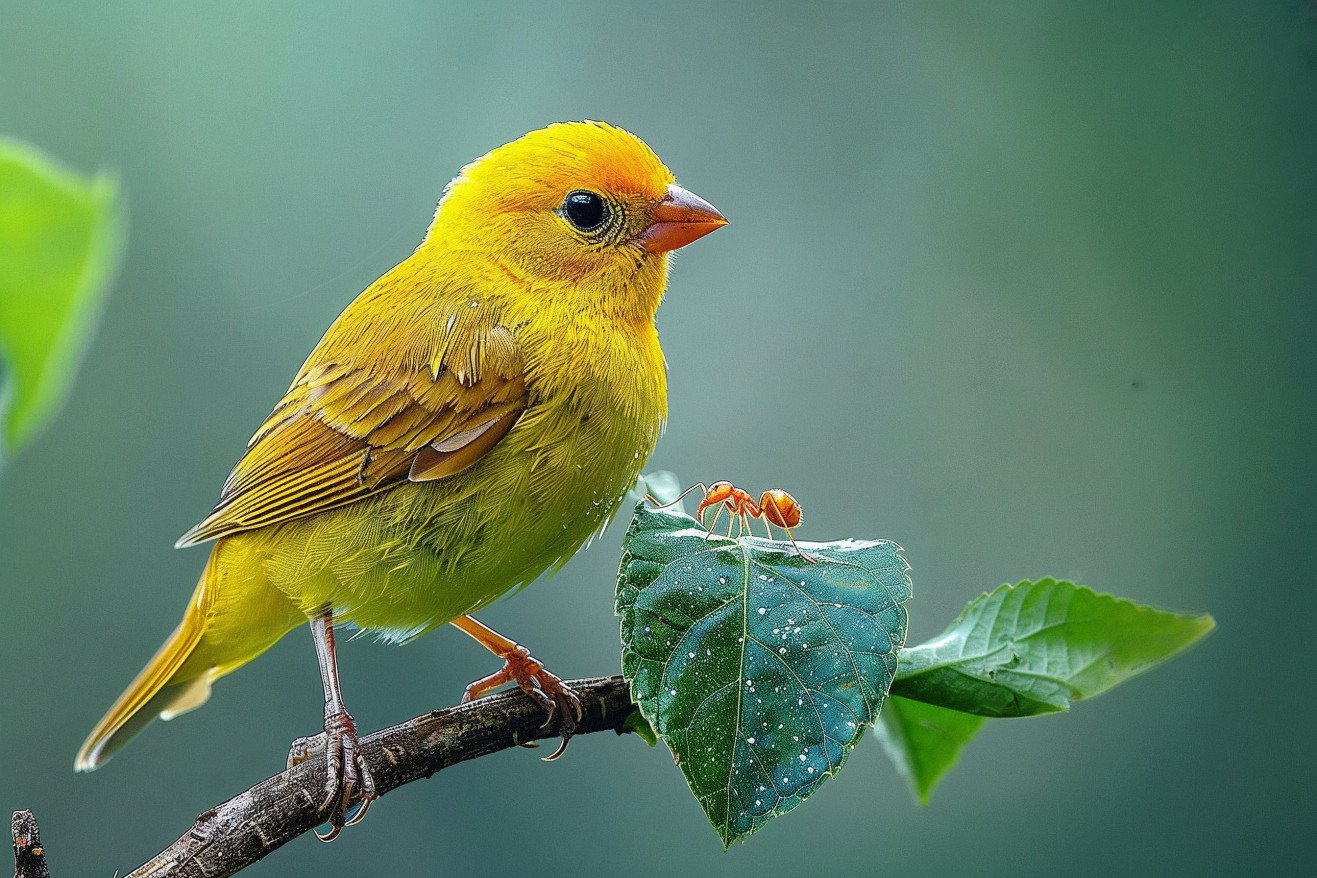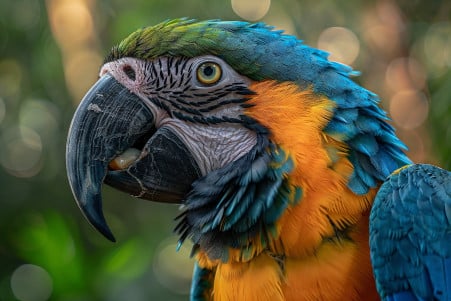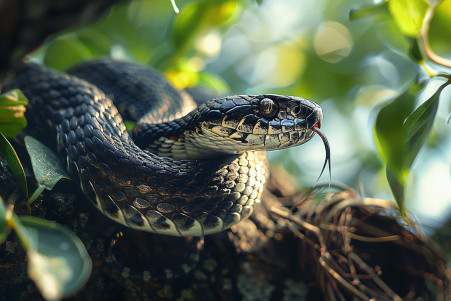What Do Birds Eat? The Science of Bird Diets
15 March 2024 • Updated 15 March 2024

Birds eat a wide variety of foods, but do birds eat ants? They sure do! In fact, many bird species, including woodpeckers, starlings, and sparrows, eat ants. Not only do ants provide birds with important nutrients like protein, zinc, and iron, but some birds also participate in ‘anting’, a behavior in which they rub ants on their feathers to get rid of parasites using the ants’ formic acid.
In this article, we will take a deep dive into research from the fields of ornithology and entomology to learn about the role ants play in the diets of different birds.
We will also look at ecological research on the impact of ants on biodiversity and learn about the origins of anting in birds. By the end of this article, you will have a better understanding of the nutritional benefits ants offer birds and the complex relationships between birds and their six-legged prey.
Do birds eat ants?
Birds That Eat Ants
The world of birds is home to a number of species that are considered feathered foragers, and many of them eat ants. Woodpeckers, including the Pileated and Downy woodpeckers, are especially well-known for their love of ants, using their long, sticky tongues and beaks to extract the insects from the wood and soil.
Starlings, which are omnivores, are also considered ant-eating birds and are often seen in groups on the ground where ants are plentiful.
Other birds that eat ants include hummingbirds, sparrows, and wild turkeys, which all eat ants occasionally and benefit from the protein and essential minerals that ants provide, according to Birdfact.
Crows and ravens are less likely to eat ants, but they will eat them when other food sources are scarce. The likelihood that these birds will eat ants is also influenced by where they live and the time of year, with birds eating more ants in the desert and when ants are more abundant.
Birds have developed a number of ways to catch ants, from pecking and digging in the ground to catching flying ants in mid-air. This insect-eating behavior is a sign of birds’ adaptability when it comes to foraging and is also an important part of the ecosystem.
Ants vs. Birds: How Ants Protect Themselves from Birds
Ants have developed a variety of defenses against birds, which serves as a clear indication of their incredible adaptability. For instance, a paper in PMC explains that the big-headed ant, Pheidole obtusospinosa, has developed a unique defense against army ant raids by using its super majors to physically block nest entrances with their enlarged heads.
This is just one example of the physical defenses that ants have evolved, which also include their powerful mandibles and, in some species, their painful stingers.
In addition to physical defenses, ants have evolved a wide range of chemical defenses. For example, Lively Ants explains that ants can release pheromones and venom, and some can even perform autothysis—a self-destructive act that releases a toxic substance that hinders attackers. Ants use formic acid or other toxic secretions to both repel predators and to warn others in their colony of danger.
The arms race between ants and the birds that prey on them is clearly responsible for the evolution of these sophisticated defenses. Ants’ defenses, including their use of chemical signals and their ability to hide their nests to avoid predation, have clearly shaped birds’ feeding behaviors, leading some species to focus on ants and other insects that are less well-defended.
Thinking about these complex defenses helps us understand the ongoing evolution of predator-prey interactions. This evolutionary dance is responsible for shaping the natural world and constantly shaping the behaviors and survival strategies of ants and the birds that eat them.
The Nutritional Goldmine: Ant Nutrients for Birds
Ants aren’t just small insects; they’re also a rich source of nutrients that are important for the health of birds. A study in the International Journal of Food Science and Technology by Ayieko et al. found that black ants, especially the species Carebara vidua from Kenya, are a rich source of protein and essential minerals, including iron, zinc, magnesium, potassium, and phosphorus.
Their fatty acid profiles contain palmitic and oleic acids, but they lack linolenic acid. These nutrients are important for birds and help ensure their health, energy, and the quality of their feathers.
Yet the role of ants in the diet of birds goes beyond their nutritional value. A study in the Journal of Animal Ecology showed that ants are important to the nutrient cycling of tropical rainforests, which suggests that ants are important to the nutritional ecology of birds.
While the benefits are many, it’s also important to consider the potential drawbacks. Some ant species have chemical defenses that could be toxic if consumed in large quantities by birds.
As a result, the relationship between ants and birds is a fine balance, with ants providing an important food source that benefits many aspects of bird life.
While we marvel at the nutritional benefits that ants provide to birds, it’s also important to recognize the nuances of their relationship, which impacts not only what birds eat but also other aspects of their lives.
Anting: A Strange Behavior That Has Physical and Psychological Effects on Birds
The study of anting demonstrates that birds’ consumption of ants has a number of physical and psychological effects. Anting, which has been observed in more than 200 species of birds, is the use of ants or ant-like substances to rub on the feathers.
Anting is thought to have several purposes, including getting rid of ectoparasites and soothing skin irritation during molting, according to a paper in Biology Bulletin Reviews. The authors also note that ants’ secretions, especially formic acid, may act as insecticides or fungicides, which could help the birds.
In addition, a paper listed on PubMed found that the cognitive and behavioral adaptations associated with anting, especially in tropical birds that forage at army ant raids, are complex. To find these hard-to-predict ant raids, birds may have evolved superior sensory and cognitive skills. Whether or not birds share information about food sources could have implications for the social behavior and communication in the bird groups that participate in these raids.
A closer look at the adaptive behaviors of birds that ant shows that anting is closely tied to avian health, social structure, and the larger ecological community. This complex relationship between birds and ants adds to our knowledge of avian ecology and evolution.
The Ripple Effect: Birds That Eat Ants and Ecosystem Dynamics
In addition to individual diets, the relationship between birds and ants has a ripple effect on the rest of the ecosystem. In the larger context of the natural world, birds that eat ants can impact not only their own ability to reproduce but also the population dynamics of both species.
The interactions between birds and ants are important for ecosystem function, according to the Proceedings of the Royal Society B. These interactions, which include everything from resource competition to predator-prey relationships, show how important it is to understand the balance of food webs.
Harvard Forest research shows that ants are important for promoting plant growth by aerating soil and dispersing seeds, which in turn supports a wide range of species up the food chain. When birds eat ants, they can impact these ecosystem services. Meanwhile, the thermal ecosystem engineering by nesting songbirds shows a mutualistic relationship with ants, as the nests of these birds can create environments that are good for ant larvae, according to Scientific Reports.
In this way, the ecological footprint of birds that eat ants is far-reaching. The importance of ants in the ecosystem and the way that birds impact their populations is important. This is especially true when it comes to conservation and making sure that the natural world is in balance.
A Mutualistic Harmony: The Final Note on Birds and Ants
In the end, the relationship between birds and ants is more than just another example of ants as a food source in the food web. Anting allows birds to use ants’ chemical defenses to protect themselves, and in doing so, it demonstrates a special kind of symbiosis.
This mutualism also shows that ants are important for birds in ways other than just as food, as they help birds keep their feathers in good condition and free of parasites.
Of course, ants are also important to birds as a food source. In addition to being abundant, ants are nutritious, providing birds with the protein and minerals they need to survive. This shows that ants are an important part of the complex food web in their ecosystems and are important to the health and survival of birds.
From an ecological perspective, the way birds eat ants can have a big impact on the populations of both species, affecting the success of birds’ reproduction and the roles ants play in their ecosystems. This shows that the relationship between birds and ants is a great example of the complexity of ecological relationships and the importance of each species to the health of the Earth’s many ecosystems.
In the end, the way birds consume ants is more than just an intriguing aspect of their biology, it’s also significant to the evolutionary progression of both birds and ants.


